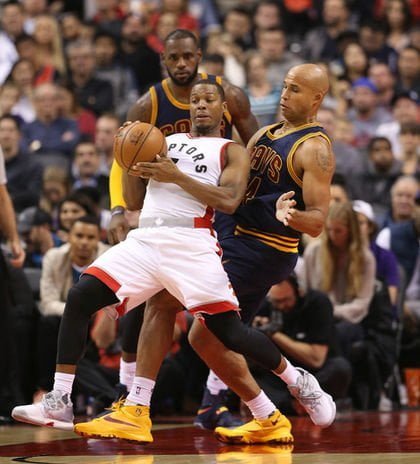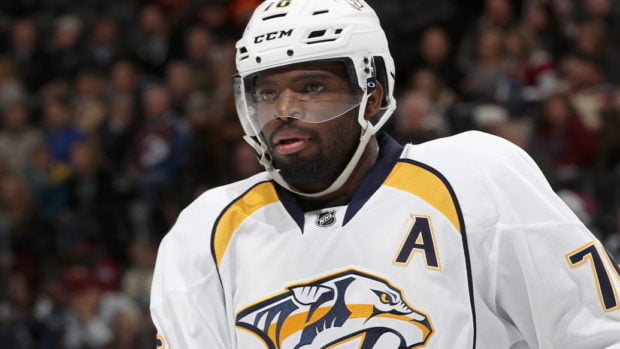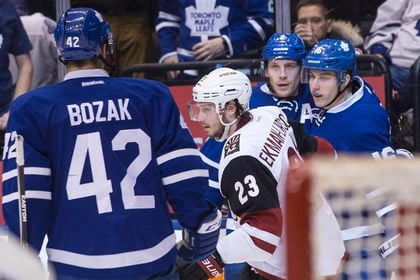P.K. Subban’s Raw Reaction to Shea Weber Trade Reveals Pang of Unfinished Business with Montreal Canadiens

P.K. Subban is on a bit of a roll about The Trade, and the possible reasons behind it.
“When I hear these things about the music, about ‘the suits you wear and the way you talk,’ or ‘you were speaking your mind’ — I mean, we’re professionals. As long as you perform like a professional on the ice, I mean, you look at my age, I’m just coming into my prime, I’m 27 years old, these are supposed to be the best years of my career coming,” he says.
“I wanted to give them to the team that drafted me.”
Subban is saying all this publicly, sort of, in an upcoming documentary, Skate Past the Noise, which will premiere on HBO Canada on Friday night. For a guy who has mostly stuck to the typical it’s-a-business type of reaction since the thunderclap of a July trade that sent him from Montreal to Nashville for Shea Weber, it’s an unusually raw reaction. He talks about the Canadiens developing into a playoff team before last season’s Carey Price injury sent them into the tank. He says he thought they were entering a contending window.
“This is what we wanted. This is what we worked for,” Subban says in a scene that was filmed last July, when the wound was fresh. “And now, I get traded. For what reason? I don’t know. As far as I’m concerned, on and off the ice, I fulfilled my responsibility.”
Today, Subban has no more clarity about the transaction that sent him from one of the best and biggest hockey markets on the planet to a relative backwater. Did he ever really figure out the reason for it?
“No, no,” Subban says in an interview. “A reason? Never … no.”
We bat around some possibilities for a while, but it’s clear Subban doesn’t want to expand on what he said in the film, which was originally supposed to be a simple off-season project to promote Brand Subban but ended up with an unexpected plot twist in the middle. Were there locker room issues? Was it an attitude thing? Was it his gambling style of play — one that had drawn a rebuke from Canadiens coach Michel Therrien at one point last season?
“I don’t know,” Subban says. “It’s not for me to make any assumption” about the motivations of Canadiens management. “I wasn’t given an answer,” he says. “But I didn’t ask, either.”
His take on it, he says, is “where I’m playing now is where I’m supposed to be playing, and I’m excited to be here.”
This is not nearly as interesting as his in-the-moment reaction in the documentary, which is much closer to the general bafflement of Canadiens fans, and more than a few members of the sports punditocracy, to the decision to ship him out of Montreal. He may want to just move on and play hockey, but Subban is for some time going to wear this trade as a proxy for the eternal hockey bun fights about playing the game the right way.
On one side is Subban, a flashy risk-taker who had won a Norris Trophy and been nominated for another, and whose underlying statistics — yes, his analytics — showed him to be one of the top two or three defencemen in the NHL. On the other is Weber, an older, slower, steadier blueline presence with a bomb of a shot.
When the trade happened, it simply looked like Therrien and GM Marc Bergevin had decided to trade the Ferrari for the high-end sedan. And it set off countless debates about whether the Canadiens should have accepted that a player with Subban’s rare talent sometimes comes with the odd turnover, rather than move him for someone who will be on their salary books until he is 41.
It is a debate that is unlikely to fade soon. Montreal’s fantastic start — 13 wins in their first 15 games — has at the very least bought Bergevin and Therrien some months of comfort; had the Canadiens opened the season with a losing streak the cries for their heads would have been ringing throughout the Bell Centre.
Weber has been a big part of that success, with six goals, three of them game winners, already. He’s never had more than four game-winning goals before in any of his 11 NHL seasons. He will almost certainly regress over the course of the year, while Price, in MVP form, will possibly not, so Montreal has every chance to get back to the playoffs.
Nashville, meanwhile, is off to a middling 6-5-3 start, and Subban is leading the team’s defence in scoring. The contrasting starts already has some observers gloating about the trade being a win for Montreal, which makes sense, since those who liked the trade in July are the same people who wouldn’t recognize that 15 games is too small a sample size to be meaningful.
Though Nashville’s relationship with the Predators is nothing like Montreal’s with the Canadiens, Subban is likely to become beloved there, too. As the documentary makes evident, he spent a lot of time and effort cultivating a relationship with Montreal. He donated money to the city’s children’s hospital and visiting its ailing patients, befriended Canadiens icons, became a face of the team in good and bad times. The film shows him returning to Montreal to host the Just for Laughs gala last summer. He is given a long standing ovation.
Subban says Predators management has been “always positive” since his arrival. “There’s no question they want me to be myself,” he tells me.
The unanswered question remains: why didn’t the Canadiens?








